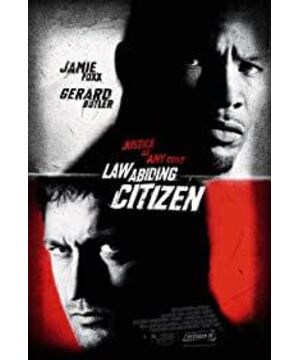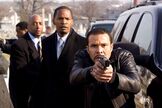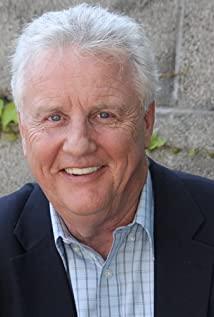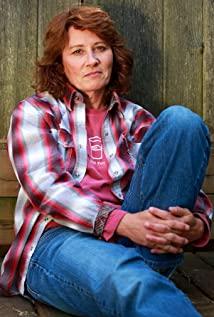Clydeburn has a happy family and lives in harmony with his wife and daughter. The story starts from a robbery case. Two thugs (A & B for short) broke into Clyde's house and injured Clyde after the robbery. The thug A ignored the dissuasion of his accomplice B and raped him in front of Clyde. his wife and daughter. Clyde's wife and daughter were tragically killed in the robbery, and the case entered judicial proceedings.
The court did not accept it due to the illegal procedure of collecting key evidence (blood samples, etc.). The lack of evidence could not convict the thugs. In pursuit of the winning rate, Nick, the prosecutor in this case, agreed to reach a plea agreement with the thug A, and A would testify against B for his own protection (light sentence). No matter how Clyde pleaded and cried against, Nick still reached an agreement with A. In this way, B, who was less guilty, was sentenced to death, while A, who committed rape and murder, was only sentenced to five years in prison. To be fair, under the legal framework of the time, it was reasonable for Nick to reach a plea agreement with one of the offenders, as Nick told Clyde, some justice is better than no justice.
Clyde, who has lost his family, wants all justice. He cried bitterly outside the courtroom, hoping that the prosecutor would even fight for it, but he was disappointed. After utter despair that the justice system would give it justice, Clyde embarks on a decade-long journey of revenge alone.
As explained later, according to others, Clyde, who is good at small inventions and holds a number of patents, is a thoughtful and scheming murderous engineer.
From the robbery, to Clyde's easy clean-up of the thug B who was executed by injection (change the ingredients of the medicine, making the death process extremely painful) and the thug A after he was released from prison (the corpse was chopped with a chainsaw, and the whole process was recorded on video), the length of two The hour-long video is only half an hour past. Obviously, Clyde's revenge drama has only just begun.
The police "easy" arrested Clyde for interrogation. Here are only two scenes (highlights) in the film that mock the current justice system:
1. Nick's first trial of Clyde. Nick thinks Clyde pleads guilty and easily "slams the dunk" (lawyer jargon). In fact, Clyde's answer deliberately modified the words and did not meet the court's conviction requirements;
2. Clyde's bail hearing. Nick suggested that the judge not grant bail, while Clyde cited judicial precedents, impassionedly quoted the words of the founding fathers on the protection of freedom, and was wary of the erosion of the rights of civilians by the judicial machine, and so on. When the female judge almost dropped the hammer and agreed to bail, Clyde turned her guns on her, mocking the female judge who had sentenced the mob burglary like a bitch in heat when she heard the words of judicial precedent and the Federalist Papers.
Ten minutes on stage, ten years off stage. When the police searched Clyde's residence, they found a large amount of legal books and materials. It is conceivable that Clyde has put a lot of effort into finding loopholes in legal texts over the years. It is a pity that only the above two points are shown in the film. The following parts are almost all violent revenge shows, and all the characters associated with past robberies—have to die.
The thug's defense lawyer - buried alive and suffocated;
female judge - cell phone bomb;
Nick's colleague and assistant Sarah and others - car bomb;
Attorney General Jonas - riot robot shooting; in
order to facilitate the operation of the prison, Clyde killed the same prisoner The roommate was locked in a single cell, and he had already secretly purchased real estate near the prison and dug through the secret passages leading to all the cells. When others thought that Clyde was serving his sentence in prison, he must have an accomplice outside the prison (the military regulations once thought it was Sarah), in fact, Clyde entered and exited the prison as if he was in a no-man's land.
Nick was appointed as the local attorney general in danger. Under the pressure of the mayor, the investigation against Clyde was launched in full swing. Anonymous provided key clues about the amount of real estate Clyde purchased, and cross-compared with Pennsylvania real estate transaction data, Nick found that Clyde purchased the property near his prison. After the search uncovers the secret passage, the final prototype of Clyde's plan is exposed to Nick.
Nick blocks Clyde's plan to blow up City Hall in time. This time, Nick did not reach a deal with the "criminal" Clyde and let Clyde live. In the explosion of Death, Clyde was like a phoenix.
The issue of judicial fairness and justice, what kind of procedures can not only allow the real criminals to subdue the law, but also prevent the innocent from being wronged? The story asks good questions, but doesn't give even the slightest good advice for the audience to ponder. In the end, it is inevitable to fall into vulgarization and replace rationality with hormones, so that there is no distinction between right and wrong.
View more about Law Abiding Citizen reviews










